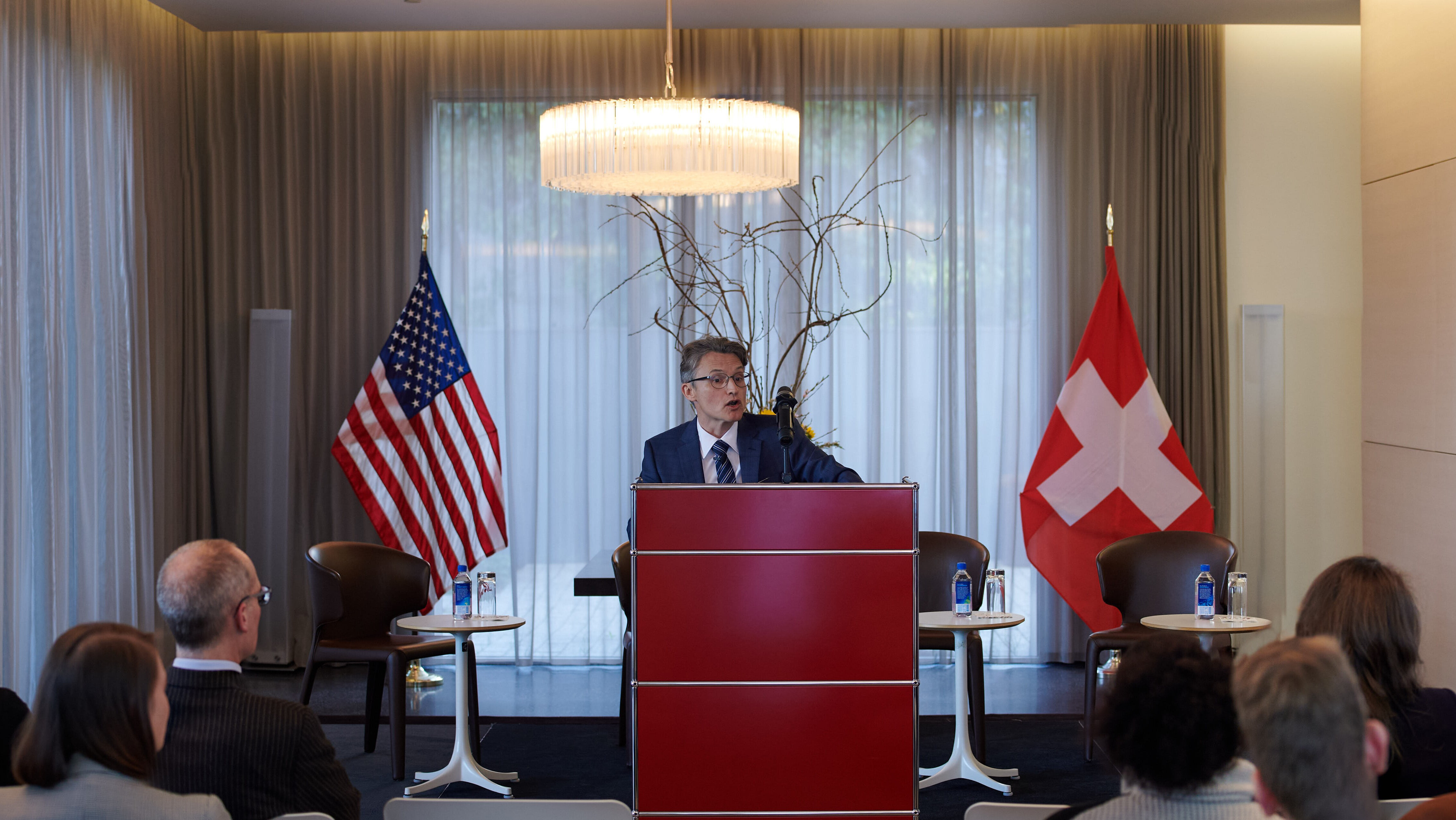UZH Brings Global Tax Debate to Washington D.C.
On 8 April 2025, the Swiss Embassy in Washington, D.C. hosted a panel discussion on the future of international tax cooperation. The event, “International Tax Policy – Where Do We Go from Here?”, was initiated by Professor René Matteotti, Chair in Swiss, European, and International Tax Law at the University of Zurich (UZH), and organized together with the Economic, Trade and Financial Affairs Section of the Embassy.

The timing was important: the global tax system is facing new challenges, especially after the United States recently changed its position on the OECD/G20 “global tax deal” of 2021, which it has recently declared to have no force or effect within the U.S. In light of this shift, a panel of leading tax experts convened at the residence of the Swiss Embassy for a timely and insightful discussion on the broader implications and possible future scenarios for the international tax framework.
René Matteotti, who is Chair of Swiss, European, and International Tax Law at the University of Zurich (UZH) and currently Global Professor of Law (Spring 2025) at the NYU School of Law, was joined on the panel by Lillian Faulhaber, Vice Dean and Ralph H. Dwan Chair in Taxation (Georgetown University), David H. Rosenbloom, Director of the International Tax Program (NYU School of Law), and Catherine Schultz, Vice President, Tax and Fiscal Policy, Business Roundtable (Global Business Alliance).
Is there really a global tax deal?
Beyond the U.S. withdrawal, the central question remains: does it still make sense to speak of a “global tax deal”? The architecture of the so-called global tax deal rests on two pillars. Pillar One seeks to allow market jurisdictions to tax a formulaically calculated share of the profits earned by large multinational corporations from consumer-facing business in those countries. Pillar Two aims to subject multinationals to a minimum tax rate of 15%, while curbing harmful tax competition. Additionally, developing and emerging countries are to be granted the right to impose withholding taxes on intra-group payments if such payments are not taxed at a minimum rate of 9% in the recipient jurisdiction (the so-called “Subject to Tax Rule”).
As René Matteotti pointed out, the notion of a unified global tax deal is largely illusory. He explained: “There is no such thing as a global tax deal. We already know that Pillar One has failed.” As for Pillar Two, by February 2025, only 55 out of approximately 139 countries had implemented the minimum tax rules – or parts of them. This group includes several low-tax jurisdictions that reluctantly introduced a domestic minimum tax to prevent other countries from accessing their tax base. Several EU countries only adopted the rules after the European Commission initiated infringement proceedings. Matteotti also emphasized the lack of traction for the “Subject to Tax Rule”: despite a ceremonial signing event in Paris, only nine countries have signed the multilateral convention so far.
“The main driving forces behind the two-pillar project are conspicuously absent among the signatories”, he observed. In his view, the ambitious initiative – originally promoted by the G7 and G20 – has, for now, failed, as the global consensus has clearly eroded. This leaves a pressing question for countries that have already implemented all or part of the so-called Global Anti-Base Erosion (GloBE) rules: how to move forward without losing face or incurring further economic harm.
The U.S. changes course

A major focus of the discussion was the U.S. recent withdrawal of support. The White House has recently announced that OECD tax rules would no longer have any force or effect. The U.S. Treasury Department was instructed to assess whether other countries impose any discriminatory, extraterritorial or disproportionate taxes on American businesses and to propose appropriate countermeasures.
David Rosenbloom from the NYU School of Law emphasized : “First, the Biden administration was never in a position to legally bind the United States. Under U.S. constitutional law, Congress has an indispensable role in international tax policy. Second, anyone familiar with U.S. politics knows that the global tax deal would never have been implemented domestically, even under a Democrat-controlled Congress. The project was doomed from the start. What has changed is merely the tone in which this reality is now being communicated.”
Legal (un-)certainty and compliance costs
While the global minimum tax may appear as a brilliantly crafted concept, its implementation is causing substantial legal uncertainty. The rules are extremely complex and give rise to numerous interpretive questions for both governments and businesses. In addition, multiple administrative guidelines have been issued – some with retroactive effect – further complicating compliance.
Particularly controversial is the compatibility of the Undertaxed Profits Rule (UTPR) with international law. There is still no consensus on which tax incentives are permissible and to what extent. A guideline clarifying this was announced for 2024 but has yet to be published. It also appears unlikely that the United States would ever accept such a framework.
Moreover, there is no internationally coordinated dispute resolution mechanism in place. The panel noted that, in addition to legal uncertainty, implementation entails significant compliance costs – often without generating meaningful additional tax revenues for states. As a result, the intended balance between fair competition and administrative practicality seems increasingly out of sync.
What’s next? Small changes or big reforms?
The panelists agreed that the current framework cannot continue in its present form. As a founding member of the OECD and the world’s largest economy, the United States plays a pivotal role in shaping the way forward, particularly given the OECD’s consensus-based model. Two potential paths were identified: either making swift adjustments through new administrative guidance or undertaking a broader reform of the model rules. Either path would require U.S. re-engagement with the OECD process.
René Matteotti emphasized that countries implementing the global minimum tax must confront a hard truth: “The global minimum tax, in its current form, is no longer viable.” He argued that it is unrealistic to assume the rules can be effectively applied to U.S. multinationals. The compromise proposals currently under discussion (in particular the extension of the transitional UTPR Safe Harbor and the recognition of the Global Intangible Low-Taxed Income, GILTI), he noted, are unconvincing “as they undermine the competitiveness of European multinational enterprises in global markets.”
Instead of patching up a failed concept with new administrative guidelines, Matteotti suggested that the OECD and the EU should pivot to a system more aligned with the U.S. GILTI Regime which is based on a global instead of jurisdictional blending. This, he explained, would ensure that multinationals are subject to a minimum level of taxation globally – “and pay their fair share – without weakening the competitiveness of European multinationals. The controversial 'Undertaxed Profit Rule' should be repealed. To address unfair competition within the European single market, the EU already has the tools of state aid law at its disposal."
The event at the Swiss Embassy offered a clear-sighted analysis of the current situation, along with a hopeful outlook that bold solutions may help restore legal certainty in the taxation of multinational companies.
Aline Spescha

